This article was co-authored by Ashlyne Mullen, PsyD. Dr. Ashlyne Mullen is a Licensed Clinical Psychologist based in New York City. She specializes in helping people through chronic illness, anxiety, depression, grief, insomnia, personal growth, and relationships. Dr. Mullen holds a PsyD in Clinical Psychology, an MS in Applied Psychology, and an MA in Educational Psychology. She has extensive training in Acceptance and Commitment Therapy (ACT), Cognitive Behavioral Therapy (CBT), Radically Open Dialectical Behavior Therapy (RO-DBT), Functional Analytic Psychotherapy (FAP), and other mindfulness-based interventions.
There are 7 references cited in this article, which can be found at the bottom of the page.
This article has been viewed 13,515 times.
If you’ve suffered a type of trauma, you may experience flashbacks that take you back to that experience. It can be really scary to feel like you are living through a traumatic experience again. Fortunately, there are some things you can do to cope. You can take steps to deal with flashbacks as they happen, such as taking deep breaths.[1] While you might not be able to completely prevent them, you can lessen the number of flashbacks by seeking support and focusing on the present.
Steps
Coping with Flashbacks in the Moment
-
1Acknowledge that you are having a flashback to help bring yourself back to the present. Flashbacks are memories that can make you feel like you are reliving a past trauma.[2] When this happens, thinking straight can be really hard. However, take a second to remind yourself that this is a memory, not reality. It will help you reconnect to the present.[3]
- Think to yourself, “This is a memory. This happened in my past and is not happening again.”
- Say it out loud if you need to. You can also repeat it as many times as necessary.
-
2Take deep breaths to calm yourself. Slowly breathe in through your nose and out through your mouth. Try counting to 4 or 5 as you inhale and repeat the count as you exhale. If you find that you're breathing quickly, you can even try mentally counting to 4 as you inhale and 5 as you exhale to help yourself calm down.[4] [5]
- Deep breathing can slow your heart rate and help you to feel calm and safe again.
Advertisement -
3Ground yourself by relying on your 5 senses. Help yourself come out of the flashback by noticing your surroundings. This will connect you to the present. Go through each of your 5 senses until you begin to feel calm. Ask yourself:[6] [7]
- What do I see? Look around and notice an object, like a table, or focus on a particular piece of scenery.[8]
- What do I hear? Notice if you can hear people talking or if there is music in the air.[9]
- What do I smell? Maybe you can focus on coffee brewing or smelling fresh air.[10]
- What do I feel? Reach out and touch something like the sleeve of your shirt or the chair that you’re sitting on.[11]
- What do I taste? Eating or drinking something during the flashback can help, even if it is just a sip of water.[12]
-
4Think about what would make you feel safe and do that thing. Try wrapping yourself in a blanket to feel secure. You can also go into a room by yourself and close the door. Do whatever it takes to make you feel safe at the moment.[13]
- Flashbacks are a really personal experience, so what makes you feel safe might be something else entirely. That’s fine! The important thing is to think of something that will help you.
-
5Focus your thoughts on something else. It can be hard to stop flashbacks. That’s totally normal and understandable. It can help if you force yourself to think of something entirely unrelated. Try to have a go-to way to distract yourself if you regularly experience flashbacks.[14]
- For example, you could recite the lyrics to your favorite song in your head. You could also try something like naming all of the state capitals. Just choose something that requires your attention and takes some concentration.
- Use a visualization exercise to bring yourself back to the present. For example, you could visualize yourself watching the flashback on TV. Then visualize yourself first turning down the volume, then turning off the TV.[15]
Preventing Flashbacks
-
1Recognize the warning signs of a flashback. After you are feeling safe again, think back to what you were experiencing right before the flashback. Jot down some notes about what you remember. This might help you see a pattern.[16]
- Many people experience physical symptoms during the onset of a flashback. If you noticed yourself sweating or feeling your pulse rate, write that down.
- If you figure out that your heart beating fast is a warning sign, you can use some of your coping mechanisms to try to prevent future flashbacks from starting.
-
2Figure out your personal triggers and try to avoid them. There might be something in particular that brings on memories of your trauma. For some people, it’s a song or the smell of a certain food. For you, it could be a certain sound or even a particular phrase.[17] [18]
- If you can try to avoid the trigger. For example, if the smell of roses triggers you, steer clear of flower shops or that section of the grocery store.
- Flashbacks are a personal and difficult experience. It’s totally fine to try to avoid any triggers, no matter what they are.
- Even if you can't totally avoid them, knowing what your triggers are can help you feel more prepared for the flashbacks when they come.[19]
-
3Spend time focusing on the present. To help yourself stop reliving past trauma, make an effort to connect more to the present. You can do that by thinking about what you like about your life right now. For example, maybe you just got a promotion at work or started a new exercise class that you love.[20]
- It can be helpful to write about what’s going on in your life. Try journaling to help yourself connect to the things in life that are making you feel good.
-
4Practice mindfulness. When you’re dealing with past trauma, it might seem tough to focus on the present. That’s normal. Try actively noticing what is going on around you. For example, take a moment to notice that the grass outside is turning green. These small acts of mindfulness can help you connect to the present more intentionally.[21]
- Remind yourself each day to be more mindful. Soon, it will become second nature to you, and hopefully, be soothing.
- Try learning to meditate. It’s a good way to become more mindful!
Seeking Help and Support
-
1Tell people close to you about your flashbacks. This is a personal journey, and you don’t have to talk about it with anyone you don’t want to. However, it might be a good idea to let a few people know what you’re going through. That way, they can be prepared to help you and offer you support.[22]
- You can say something like, “I wanted to let you know I’ve been having flashbacks. If I call you and sound really upset, that’s probably what’s going on. It will really help me if you can talk to me until I feel safe again.”
-
2Do something kind for yourself after a flashback. Flashbacks can feel really intense and emotionally draining. You might feel exhausted after coming out of one. Whatever you’re feeling is okay. What matters is that you take some time to be kind to yourself. Allow yourself to relax and do something you enjoy.[23]
- You could try snuggling under your favorite blanket with a cup of tea. Grab one of your favorite books to read, too!
- Ask a friend if they want to come over and watch a funny movie.
-
3Visit a therapist to get professional help. It’s totally normal to have a hard time dealing with flashbacks. They’re really tough! Try seeking professional help. A trained therapist can help you learn ways to cope in the moment and also help you prevent future flashbacks.[24]
- Ask friends and family if they have a therapist they recommend. Your primary care physician is also a great resource.
- Look for a therapist who has experience helping survivors of traumatic experiences.
-
4Join a support group for other survivors. You’re dealing with a lot and it’s important that you get some emotional support. Try joining a support group for people who have had similar experiences. It can feel really helpful to talk to people who understand the tough stuff you’re going through.[25]
- Ask your therapist if they know of any local groups. You can also look online for a group that might be helpful to you.
- If you’re more comfortable, you can join an online community of survivors.
-
5Be patient with yourself. You’re processing a lot of emotions, and that can be hard. It’s also normal, so try to be patient. Remember that your feelings are valid and that you’re doing your best.[26]
- If you find yourself getting frustrated, say to yourself, “I’m doing the best I can. It may take time, but I will make it through this.”
Expert Q&A
-
QuestionHow do you recover after a flashback?
 Ashlyne Mullen, PsyDDr. Ashlyne Mullen is a Licensed Clinical Psychologist based in New York City. She specializes in helping people through chronic illness, anxiety, depression, grief, insomnia, personal growth, and relationships. Dr. Mullen holds a PsyD in Clinical Psychology, an MS in Applied Psychology, and an MA in Educational Psychology. She has extensive training in Acceptance and Commitment Therapy (ACT), Cognitive Behavioral Therapy (CBT), Radically Open Dialectical Behavior Therapy (RO-DBT), Functional Analytic Psychotherapy (FAP), and other mindfulness-based interventions.
Ashlyne Mullen, PsyDDr. Ashlyne Mullen is a Licensed Clinical Psychologist based in New York City. She specializes in helping people through chronic illness, anxiety, depression, grief, insomnia, personal growth, and relationships. Dr. Mullen holds a PsyD in Clinical Psychology, an MS in Applied Psychology, and an MA in Educational Psychology. She has extensive training in Acceptance and Commitment Therapy (ACT), Cognitive Behavioral Therapy (CBT), Radically Open Dialectical Behavior Therapy (RO-DBT), Functional Analytic Psychotherapy (FAP), and other mindfulness-based interventions.
Licensed Clinical Psychologist Remind yourself that everything will be oaky. You have gotten through this before, and you can do it again. This feeling, memory, and image, will pass!
Remind yourself that everything will be oaky. You have gotten through this before, and you can do it again. This feeling, memory, and image, will pass!
Warnings
- If you feel like you can’t cope with your flashbacks, visit a mental health professional.⧼thumbs_response⧽
References
- ↑ Ashlyne Mullen, PsyD. Licensed Clinical Psychologist. Expert Interview. 23 August 2021.
- ↑ Ashlyne Mullen, PsyD. Licensed Clinical Psychologist. Expert Interview. 23 August 2021.
- ↑ https://www.rainn.org/articles/flashbacks
- ↑ https://www.mind.org.uk/information-support/types-of-mental-health-problems/post-traumatic-stress-disorder-ptsd-and-complex-ptsd/self-care/#TipsOnCopingWithFlashbacks
- ↑ Ashlyne Mullen, PsyD. Licensed Clinical Psychologist. Expert Interview. 23 August 2021.
- ↑ https://www.rainn.org/articles/flashbacks
- ↑ Ashlyne Mullen, PsyD. Licensed Clinical Psychologist. Expert Interview. 23 August 2021.
- ↑ Ashlyne Mullen, PsyD. Licensed Clinical Psychologist. Expert Interview. 23 August 2021.
- ↑ Ashlyne Mullen, PsyD. Licensed Clinical Psychologist. Expert Interview. 23 August 2021.
- ↑ Ashlyne Mullen, PsyD. Licensed Clinical Psychologist. Expert Interview. 23 August 2021.
- ↑ Ashlyne Mullen, PsyD. Licensed Clinical Psychologist. Expert Interview. 23 August 2021.
- ↑ Ashlyne Mullen, PsyD. Licensed Clinical Psychologist. Expert Interview. 23 August 2021.
- ↑ https://www.rainn.org/articles/flashbacks
- ↑ https://www.livingwell.org.au/managing-difficulties/dealing-with-flashbacks/
- ↑ https://www.livingwell.org.au/managing-difficulties/dealing-with-flashbacks/
- ↑ https://www.rainn.org/articles/flashbacks
- ↑ https://www.rainn.org/articles/flashbacks
- ↑ Ashlyne Mullen, PsyD. Licensed Clinical Psychologist. Expert Interview. 23 August 2021.
- ↑ Ashlyne Mullen, PsyD. Licensed Clinical Psychologist. Expert Interview. 23 August 2021.
- ↑ https://www.mind.org.uk/information-support/types-of-mental-health-problems/post-traumatic-stress-disorder-ptsd-and-complex-ptsd/self-care/#TipsOnCopingWithFlashbacks
- ↑ https://www.psychologytoday.com/us/blog/mindfulness-insights/201909/what-is-trauma-and-can-mindfulness-help-treat-it
- ↑ https://publicdocuments.sth.nhs.uk/pil1052.pdf
- ↑ https://www.livingwell.org.au/managing-difficulties/dealing-with-flashbacks/
- ↑ https://www.livingwell.org.au/managing-difficulties/dealing-with-flashbacks/
- ↑ https://www.healthyplace.com/ptsd-and-stress-disorders/ptsd/how-to-cope-with-and-stop-ptsd-flashbacks
- ↑ https://www.mind.org.uk/information-support/types-of-mental-health-problems/post-traumatic-stress-disorder-ptsd-and-complex-ptsd/self-care/#TipsOnCopingWithFlashbacks

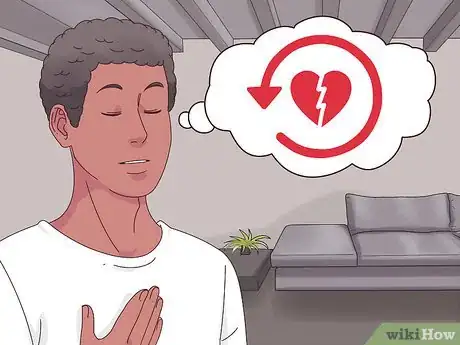

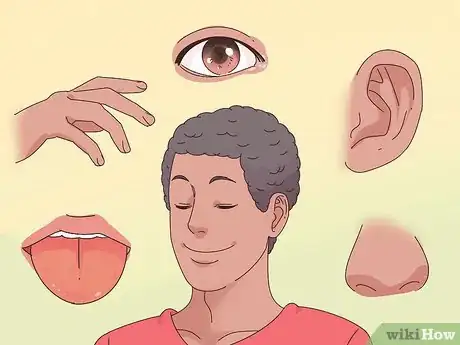

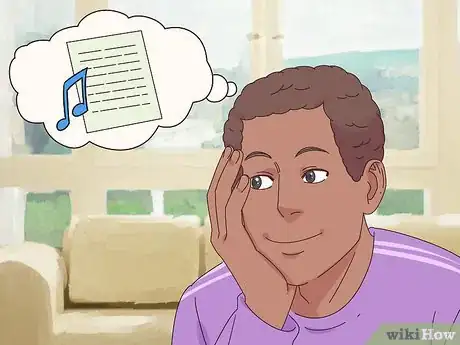




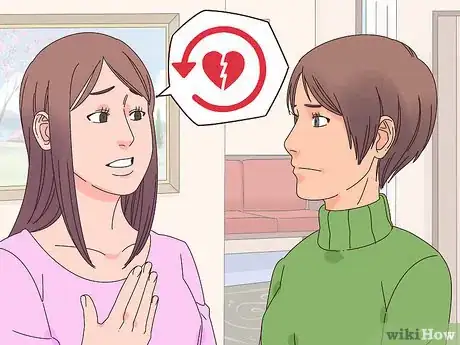

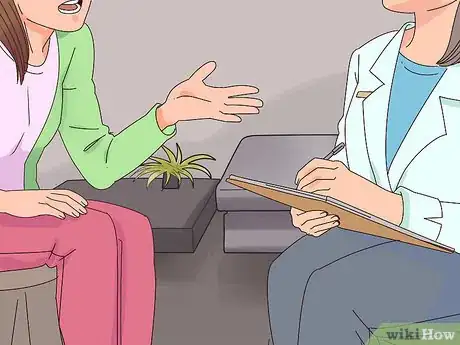






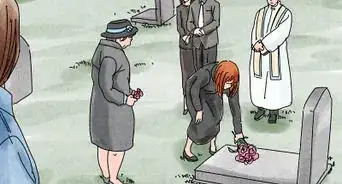



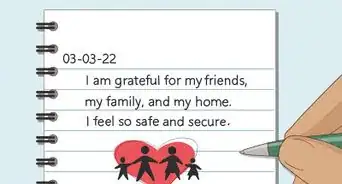
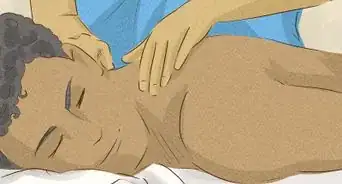



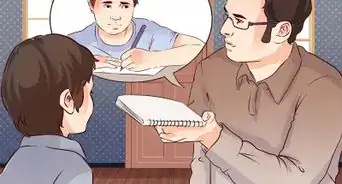






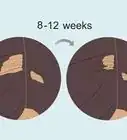


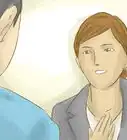




































Medical Disclaimer
The content of this article is not intended to be a substitute for professional medical advice, examination, diagnosis, or treatment. You should always contact your doctor or other qualified healthcare professional before starting, changing, or stopping any kind of health treatment.
Read More...